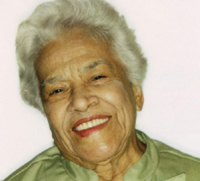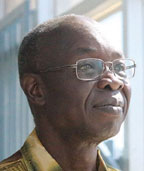
By Stacy M. Brown, NNPA Newswire Correspondent@StacyBrownMedia
Known as the “Queen of Creole Cuisine,” Leah Chase carved out quite the niche in and around New Orleans for more than six decades.
During that time, she fed individuals like Quincy Jones, Jesse Jackson, Duke Ellington, Thurgood Marshall, James Baldwin, Ray Charles, Presidents George W. Bush and Barack Obama and countless others as Executive Chef of Dooky Chase’s Restaurant — one of the best-known and most culturally significant restaurants in New Orleans.
“If your soul is in New Orleans, I know what to give you,” Chase once said in response to being asked if she served soul food.
“I’m going to give you some jambalaya. I can give you some stewed chicken. I can give you some shrimp Creole,” she said.
The renowned cook and freedom fighter, Chase died on Saturday, June 1. She was 96.
“Her daily joy was not simply cooking but preparing meals to bring people together. One of her most prized contributions was advocating for the Civil Rights Movement through feeding those on the front lines of the struggle for human dignity,” Chase’s family said in a statement announcing her death.
“She saw her role and that of Dooky Chase’s Restaurant to serve as a vehicle for social change during a difficult time in our country’s history,” the family said.
Born on January 6, 1923 in New Orleans, Chase was one of 14 children. She was raised in the small town of Madisonville, Louisiana.
There were no high schools for black children, so after sixth grade, Chase moved to New Orleans to live with an aunt, according to her official biography.
After completing high school, Chase had a colorful work history including managing two amateur boxers and becoming the first woman to mark the racehorse board for a local bookie.
Her favorite job, though, was waiting tables in the French Quarter.
It was there that she developed her love for food and feeding others.
In 1946, she married local musician Edgar “Dooky” Chase Jr., whose father had opened a street corner stand selling lottery tickets and his wife’s homemade po’boy sandwiches.
Eventually, Leah and Dooky Jr. took over the business, which by then had become a sit-down restaurant and a favorite local gathering place.
In a town deeply divided by segregation, Dooky Chase’s Restaurant was one of the only public places in New Orleans where mixed race groups could meet to discuss strategy for the local Civil Rights Movement.
Although such gatherings were illegal through most of the 1960s, Dooky Chase’s was so popular; it would have caused a public uproar if local law enforcement had interrupted the meetings.
Black voter registration campaign organizers, the NAACP, backdoor political meetings and countless others often found a home at Dooky Chase’s, and Leah cooked for them all, her biography noted.
Chase was also a patron of Black art and her collection — displayed on the walls of her restaurant — was at one time considered New Orleans’ best collection of African American art.
Until her death, Chase served on the board of the New Orleans Museum of Fine Arts and once testified before Congress to lobby for greater funding for the National Endowment for the Arts.
She participated in countless political campaigns and has used her culinary talents and celebrity to raise money for a myriad of charities and services.
Her cookbooks, including “The Dooky Chase Cookbook,” “And Still I Cook,” and “Leah Chase: Listen, I Say Like This,” are popular and have received great praise among her most famous colleagues.
“Leah Chase was a legend, an icon and an inspiration,” New Orleans Mayor LaToya Cantrell said.
“It is impossible to overstate what she meant to our City and to our community. At Dooky Chase’s Restaurant: she made creole cuisine the cultural force that it is today,” Cantrell said.
Chase fed Freedom Riders during the Civil Rights Movement and she fed James Meredith and put him up the night before he integrated the University of Mississippi, said Kristen Clarke, the president and executive director of the National Lawyers Committee for Civil Rights Under Law.
“She provided a space for whites and Blacks to strategize when other restaurants wouldn’t,” Clarke said.




Be the first to comment